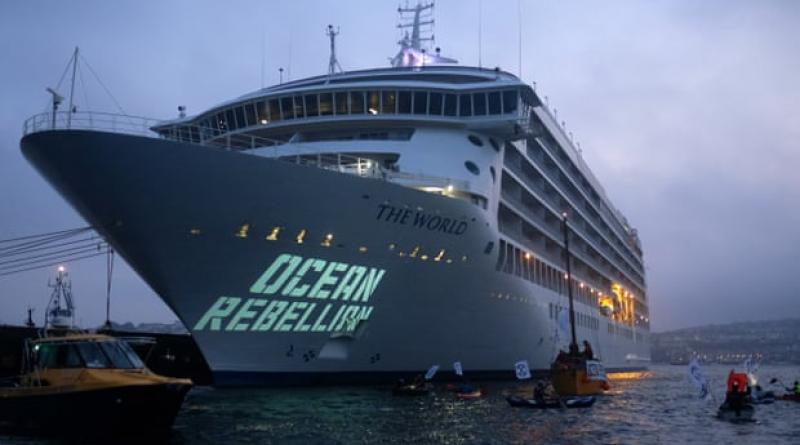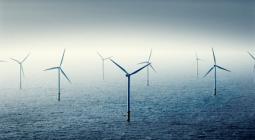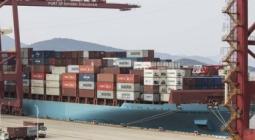Ocean Rebellion climate action group launches with protest against cruise ship.

Climate activists linked to Extinction Rebellion projected protest messages onto hull of the World vessel in Falmouth, Cornwall.
A “sea-faring sister” of climate resistance group Extinction Rebellion (XR) launched this week with a protest against a 196-metre (644ft) luxury cruise liner docked in Falmouth, Cornwall, aimed at highlighting the environmental impact of cruise shipping.
In its first action, Ocean Rebellion used guerilla advertising tactics to project films, slogans and messages, including “Turn the Tide” and “Fuck this ship”, on the hull of the World, a converted ocean liner that bills itself as the largest private residential ship on the planet. Residents aboard the ship are promised “a life of adventure at the pinnacle of luxury” as the ship continuously circumnavigates the globe, according to its website, although there are currently no residents aboard because of the Covid-19 pandemic.
Set up by a group of activists linked to XR, Ocean Rebellion plan to use a series of disruptive, non-violent actions aimed at tackling biodiversity loss, overfishing, the impact of the climate emergency on the ocean, and deep-sea mining.
Rob Higgs, 44, a member of the group and inventor who lives in a 30ft fishing boat in Falmouth with his family, said Ocean Rebellion was small, with about 50 activists, and grew out of the XR movement. But there were big differences between the two groups, he said, including a reluctance by OR to use arrest as a means of protest. Ocean Rebellion is a separate organisation, with a non-hierarchical structure.
“What we were doing is entirely legal,” he said of the first protest. “My motive is to raise awareness out there, to get people talking. I didn’t know how polluting the cruise industry is, but I do now. We need systemic change in shipping.”
XR launched in 2018 and one of its first actions was the blocking of bridges and roads in London to highlight the climate emergency. Before long, it grew to a movement with groups in 75 countries. Higgs said its ocean-related cousin aims to work with other groups, including Greenpeace and Sea Shepherd, to pursue three main aims: to tell the truth about ocean destruction; to reverse drivers of ocean warming, acidification and sea level rise by 2025; and to hold the UN to its duty to govern the seabed for the benefit of mankind, rather than the interests of a few.
But the group immediately came under fire over a series of claims made about the World’s pollution emissions, at least one of which turned out to be wrong. A spokesperson for the World questioned the evidence for the claims and the basis on which the figures were calculated. They said the ship conformed to industry best practice on emissions and pollution and used low-sulphur fuel.
The activists used comparisons provided by Transport and Environment (T&E), a European organisation campaigning for tougher environmental standards, to claim that the fuel used by cruise ships like the World is 100 times more polluting than diesel fuel used by cars, in terms of emissions of sulphur oxides. Sulphur oxides are harmful to human health, causing respiratory symptoms and, in the atmosphere, acid rain.
T&E said it stands by that particular calculation, but admitted it had introduced errors in assumptions over comparisons of how much carbon dioxide each of the ship’s apartments emitted compared to an equivalent on land.
Lucy Gilliam, the aviation and shipping campaigner for T&E, said of the World’s fuel choice: “It may be low in sulphur but it is still high-sulphur marine fuel, with 1,000ppm of sulphur, compared to 10ppm of sulphur for diesel fuel for roads. They are burning dirtier fuel than cars. We as T&E want tougher rules on ships.”
A spokesperson for the World said: “The World is a clean class vessel that conforms to industry best practices regarding emissions, water treatment, sewage plant and waste management systems. It operates on low sulphur (less than 0.1% sulphur) marine gas oil, the cleanest marine fuel available and has a ‘zero discharge to sea’ policy – no solid garbage of any kind is released to sea, even when permitted by international pollution regulations. A dedicated health, safety and environmental officer on board is responsible for oversight of occupational safety, environmental and public health policies, procedures and systems”
A three-bedroomed apartment aboard the yacht cost a reported $2m-$15m(£1.5m-£11.4) in 2017.
21 August 2020
The Guardian




